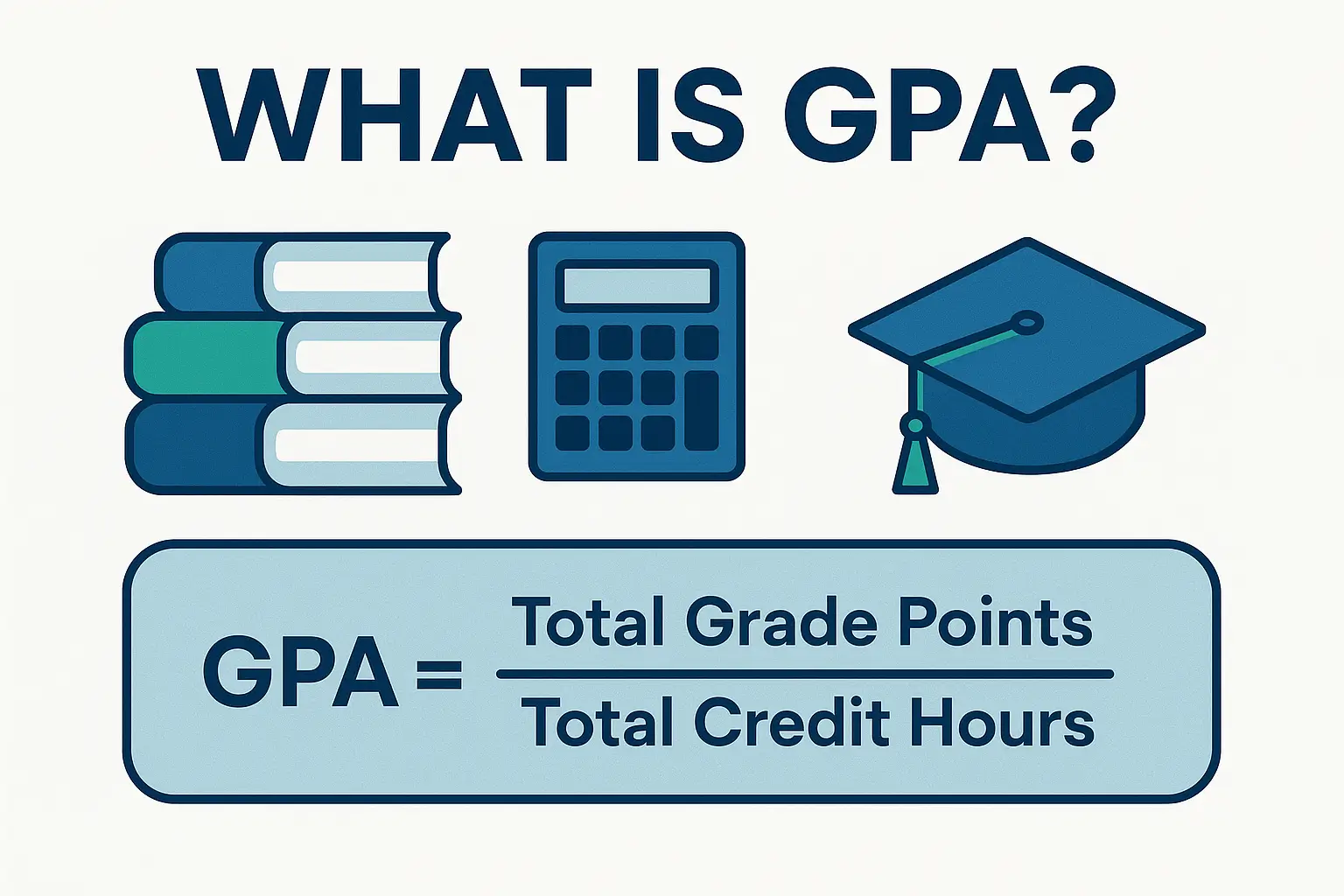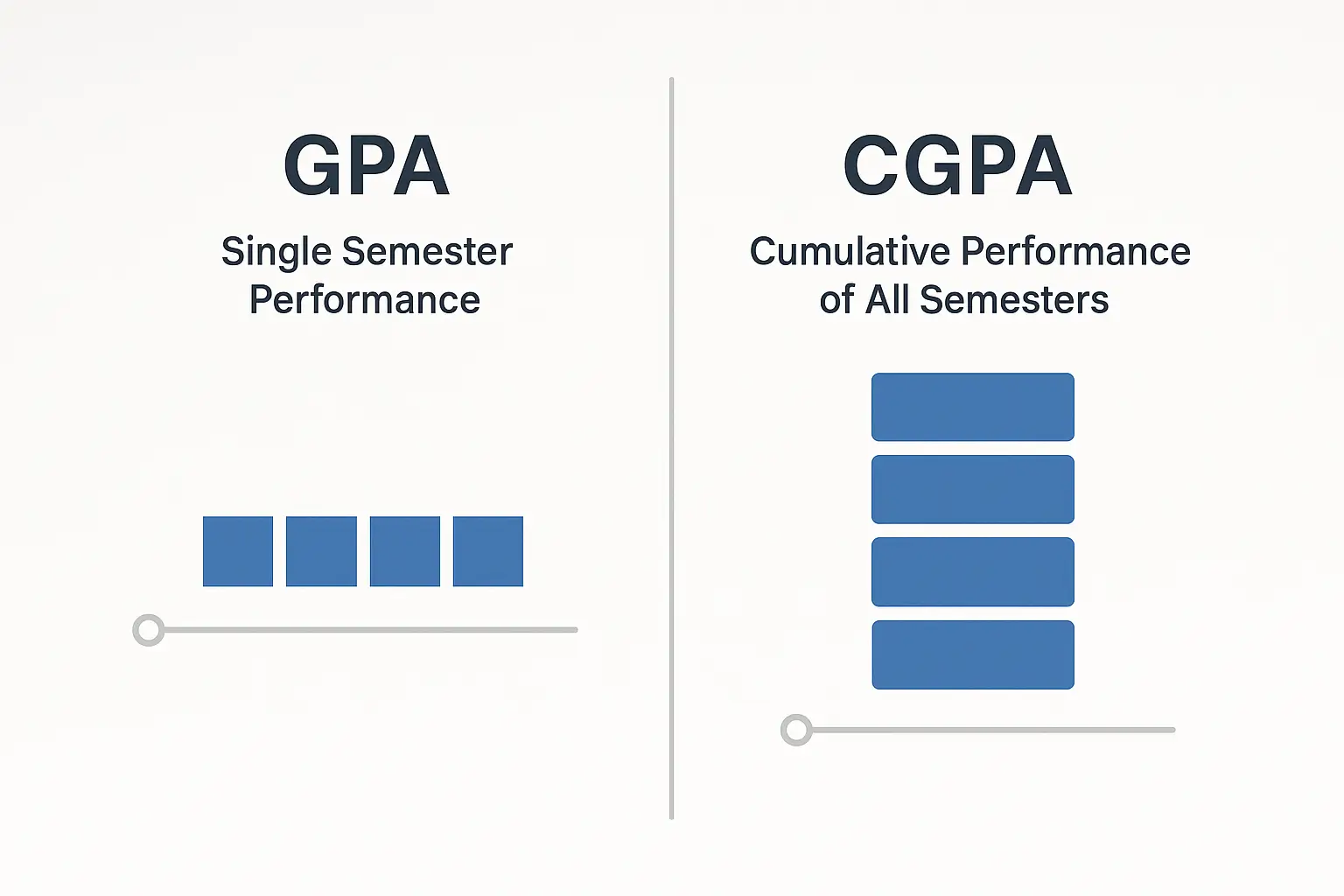What is GPA, and how is it calculated?
In education, GPA is a simple number that summarizes a student’s overall academic performance. Universities worldwide use GPA to evaluate admissions, scholarships, and academic progress.
Introduction to GPA
What is GPA?
GPA, or Grade Point Average, is a numerical value that measures a student's academic performance. In simple terms, GPA is the average of your grades converted into points. It serves as a summary figure on your academic record, helping universities and employers evaluate your consistency and performance.
Why GPA Is Important for Students
GPA is very important for every student's career. Universities evaluate GPA when making admission decisions, awarding scholarships, and offering internship opportunities. A high GPA represents a student's discipline, focus, and knowledge level. From my own experience, consistently maintaining a 3.7+ GPA during my bachelor’s degree helped me secure scholarships and made internship opportunities more accessible.
GPA in Schools, Colleges, and Universities
- At the school level, GPA mainly motivates students to strengthen their basics.
- At the college level, GPA decides what specialization or major you will get a chance to pursue.
- At the university level, GPA is a critical factor in future opportunities (scholarships, graduate programs, jobs).

Understanding the GPA System
How GPA Reflects Academic Performance
GPA is a cumulative performance indicator. If you are weak in one subject and strong in another, your GPA shows the balance of both. It provides a complete picture of a student’s overall performance.
Different GPA Scales (4.0, 5.0, 10.0)
- 4.0 scale (USA, Pakistan, Canada): Most common, A=4.0, B=3.0, etc.
- 5.0 scale (some schools): For advanced courses or honors classes.
- 10.0 scale (India and parts of Europe): Provides a wider range for differentiating student performance.
GPA vs. Percentage vs. Grades
- Percentage = Raw score (e.g., 85%)
- Grades = Alphabetical representation (A, B, C)
- GPA = Grade point average converted to numeric points
A common mistake is directly equating GPA with percentage, which is incorrect.
Common Misconceptions About GPA
- A single subject grade has limited impact; what truly matters is the cumulative average across all subjects.
- Having a high GPA is important, but skills and extracurriculars are equally important.
How is GPA Calculated?
Basic Formula of GPA
It is the basic formula that is used everywhere to calculate the GPA of subjects and semesters.
GPA = Total Grade Points / Total Credit Hours
Credit Hours and Their Role in GPA Calculation
Each course has a weight, which is decided by credit hours. For example, a 3-credit-hour course will have more impact than a 1-credit-hour course.
Weighted vs. Unweighted GPA
- Unweighted GPA: Simple average, maximum 4.0 scale.
- Weighted GPA: Honors/AP courses are weighted the same as the 5.0 scale.
Step-by-Step Example of GPA Calculation
Example 1 - Single Subject GPA
Suppose a course has 3 credit hours and the student received an "A" grade (4.0 points):
Example:GPA = 3 x 4.0 / 3 = 4.0
Example 2 - Multiple Subjects GPA
- English (3 CH, Grade B=3.0) → 9 points
- Math (4 CH, Grade A=4.0) → 16 points
- Physics (2 CH, Grade C=2.0) → 4 points
GPA = (9 + 16 + 4) / (3 + 4 + 2) = 29 / 9 = 3.22
GPA Types You Should Know
Semester GPA vs. Cumulative GPA (CGPA)
- Semester GPA: Average of courses of one semester only.
- CGPA: Combined average of all semesters in the entire degree.

Major GPA vs. Overall GPA
- Major GPA: GPA of the subjects related to the major.
- Overall GPA: GPA of all subjects.
High School GPA vs. College GPA
High school GPAs count more for admissions and scholarships, while college GPAs are critical for careers and grad school.
Global GPA Systems
GPA in the USA
Mostly 4.0 scale. Employers and grad schools reference GPAs directly.
GPA in the UK (Honours Classification)
- First Class (70%+)
- Upper Second (60 - 69%)
- Lower Second (50 - 59%)
- Third Class (40 - 49%)
GPA in Europe and ECTS
The ECTS credit system uses grades such as A, B, C, D, and E, which are converted into GPA equivalents.
GPA in Asia (India, Pakistan, China)
- India: 10-point scale
- Pakistan: 4.0 scale (HEC standard)
- China: 4.0 scale + percentage combination
Why GPA Matters
Impact of GPA on Scholarships
There is a minimum GPA requirement for scholarships, such as 3.0 or 3.5.
GPA in Job Applications and Internships
Recruiters first filter new graduates based on GPA.
GPA for Graduate Admissions
Top universities like Harvard and Oxford evaluate high GPAs and skills.
Pros and Cons of the GPA System
Advantages of the GPA System
- Simple and universal metric
- Easy comparison among students
Limitations and Criticisms of GPA
- Does not reflect the real potential of each student
- Does not measure skills and creativity
How to Improve Your GPA
Study Habits and Time Management
Avoid last-minute cramming and instead maintain consistent daily study sessions.
Using Academic Resources (Tutors, Study Groups)
Peer study groups are very helpful in understanding complex topics.
Managing Course Load Effectively
Maintain a balance between difficult and easy courses.
Real-Life Tips from Top Students
One of my seniors had said, "Consistency is more important than studying 10 hours once a week. Even 1 hour a day can dramatically improve GPA."
GPA Tools and Resources
Online GPA Calculators
A web-based tool where you can enter your grades and credit hours and instantly calculate the GPA.
Personally, whenever I have to calculate my GPA, I prefer online automatic calculators over the manual method. In manual calculations, credit hours and grade points have to be multiplied and divided again and again, in which the chances of errors are very high. Online tools instantly give accurate results and also save time. For me, the most reliable tool is Online GPA Calculator by ctool.fun, where I just enter grades and credit hours, and I get the exact GPA in one click. That is why I always use online automatic calculators for my academic planning.
GPA Conversion Charts
It is necessary to use the official university charts for percentage-to-GPA conversion.
University Guidelines for GPA
Each university has its own grading policy, so be sure to check the official handbook.
Frequently Asked Questions (FAQs)
GPA meaning in education
The meaning of GPA in education is simple—it is a number that summarizes a student’s overall academic performance. Universities worldwide use GPA to evaluate admissions, scholarships, and academic progress.
Importance of GPA for Students
The Importance of GPA for Students can’t be ignored, as it directly impacts scholarships, career opportunities, and even graduate school admissions.
How to improve GPA fast
Many students ask how to improve their GPA fast. The best strategies include managing your time, retaking weak courses, joining study groups, and maintaining consistency instead of cramming.
GPA requirements for scholarships
Most universities clearly define GPA requirements for scholarships. For example, some require a minimum 3.0 GPA, while competitive scholarships often need 3.5 or higher.
Difference between GPA and CGPA
A common doubt among students is the difference between GPA and CGPA. GPA usually refers to performance in one semester, while CGPA is the cumulative average of all semesters.
What is a good GPA in college?
Generally, 3.0+ is considered good, 3.5+ excellent, and 3.8+ outstanding.
Is a 3.5 GPA Good for College Students?
Yes, a 3.5 GPA shows academic excellence and is strong for scholarships/grad school admissions.
How Can I Calculate My GPA Easily?
Use an online GPA calculator or the official formula with credit hours.
Can a Low GPA Be Improved?
Of course! Time management, retaking weak courses, and consistent effort can improve GPA.
Conclusion
Key Takeaways About GPA
- GPA is a numerical reflection of performance.
- GPA plays a crucial role in admissions, scholarships, and job opportunities.
- Improving is not difficult if the approach is smart.
Final Thoughts and Student Advice
For me, GPA was a guiding metric, but skills and networking played an equally important role in my career. If you also focus on soft skills along with improving your GPA, then your chances of success multiply.
 CTOOL
CTOOL